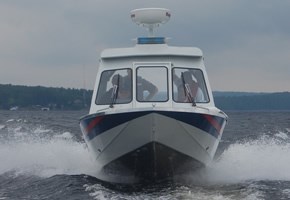Noëlville OPP Detachment commander staff Sgt. Tim Foster and SAVE Unit (Snowmobile ATV Vessel Enforcement) member, Sgt. Kevin Sydock, would like to remind boaters of their responsibilities to be properly equipped when operating boats, and in ensuring the safety of those on board.
As of April 1, 1999, all Personal Watercraft (PWC) operators in Canada must be at least 16 years of age and all operators must have proof of competency by Sept. 15, 2002. All operators born after April 1, 1983, must have proof of competency on board. Being a safe boater means having a basic level of boating knowledge. The new Competency of Operators of Pleasure Craft Regulations require operators to have proof of competency and to carry it on board at all times while operating a power-driven boat for recreational use.
The following is a list of some of the required and mandatory safety equipment items for some PWCs:
- Vessel licence - Make sure your PWC is properly licensed and marked.
- Canadian-approved personal flotation device or life-jacket of appropriate size for each person on board.
- Buoyant heaving line of 15 metres.
- Watertight flashlight or three Canadian-approved flares of type A, B or C.
- Sound-signaling device, such as a horn or whistle.
- One manual propelling device or an anchor with not less than 15 metres of cable, rope or chain in any combination.
- One bailer or one manual water pump fitted with, or accompanied by, sufficient hose to enable a person using the pump to remove water from the bilge of the vessel over the side.
Boats vary in their size and configuration. Larger vessels need more space to manoeuvre and greater distances to stop. In addition, larger vessels tend to have blind spots that can limit the operator’s view of smaller vessels operating nearby. Persons operating larger boats must also be mindful of the wake potential of their craft. A large wake can easily upset smaller craft and can cause property damage along shorelines.
Boating Restriction Regulations limit speed to 10 km/hr when operating within 30 metres of shore. For the safety of all people sharing the waterways, maintain a respectful distance from other boats and allow enough room to correct a course. A boat’s handling characteristics will vary depending on speed, wind and water conditions.
Common sense and courtesy are key components in maintaining safe waterways. Consider taking a Boating Safety Course for a better knowledge of the rules of navigation. Upon successful completion of the course, you will be issued a Marine Operator’s Competency Card which will be required Sept. 15, 2009.
The OPP is committed to ensuring Ontario’s waterways are safe, family-oriented places. SAVE Units will be conducting marine patrols until late fall.
Citizens with specific, localized concerns are encouraged to call the OPP at 1-888-310-1122.
To find out more about boating regulations, pick up a free copy of the Safe Boating Guide at any OPP Detachment or visit the Coast Guard website at www.ccg-gcc.gc.ca.



